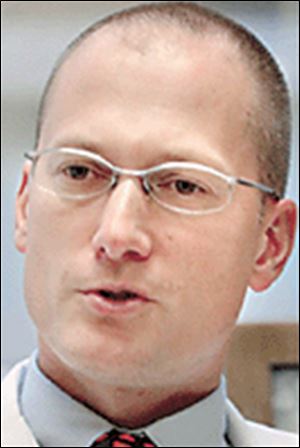
Study finds Lipitor has more merit than others
3/3/2004
Cooper
A high dose of the cholesterol-lowering drug Lipitor stops fatty plaque build-up in heart arteries “in its tracks” and much better than Pravacol, another common cholesterol-lowering drug, a recent study has shown.
Those numbers are expected to grow, given that heart disease is the No. 1 killer of men and women, and baby boomers are entering the prime age for heart problems.
Dr. Christopher Cooper, a Medical College of Ohio cardiologist who was one of the authors of the study, said the results suggest “we may be able to prevent the progression of coronary artery disease - and that s a substantial [finding].”
Physicians, though supportive of statin use, have disagreed on the most effective dosage and type of statin.
In the study Dr. Cooper and his colleagues compared patients taking 40 mg of pravastatin, the generic form of Pravacol, to those taking 80 mg of atorvastatin, the generic form of Lipitor. About 60 of the 502 patients in the study were followed at MCO.
“What we found, and this is why this is so exciting, is when we gave the 80 mg dose, we saw no progression of the disease at all. We literally stopped the disease in its tracks,” said Dr. Steve Nissen, lead study author and a researcher at the Cleveland Clinic.
He said he doubted an 80 mg dose of Pravacol would have helped. At the time of the study, the highest dose of that drug allowed by the Food and Drug Administration was 40 mg, but other research has found higher doses of that statin have little impact.
The drug company Pfizer, which makes Lipitor, funded the study. Dr. Nissen said the company didn t influence the results, and if the findings had shown Lipitor performed poorly he d be just as outspoken about it.
Dr. Nissen said the high dose of Lipitor lowered bad cholesterol levels, known as LDL, to 79 mg; doctors recommend keeping LDL below 100. Pravacol reduced levels to 110. In addition, plaque build-up in heart vessels was stopped with Lipitor and only slowed down with Pravacol.
Drs. Nissen and Cooper said that because of the research they have begun prescribing 80 mg of Lipitor, when appropriate, instead of lower doses or other statins. Both stressed that patients should discuss with their physician what dose and statin are appropriate for them.
A University of Michigan statin researcher not involved in Dr. Nissen s study called the findings “definitely provocative and quite important” but said he is not ready to change what he recommends to patients.
Dr. Debabrata Mukherjee, who works at UM s Cardiovascular Center, said he really wants to know if patients taking the high dose of Lipitor did better, not just if they lowered their bad cholesterol or stopped cholesterol plaque build-up.
“What patients care about is if they re living longer and does [the higher dose] prevent heart attacks and stroke,” he said.
Dr. Nissen acknowledged the research doesn t prove whether patients did better, but said most other research has found that lowering bad cholesterol and reducing cholesterol plaque build-up prolong life.
Dr. Mukherjee said a more definitive answer might become available next week when research comparing death and sickness rates among different statin patient groups is presented at an American College of Cardiology conference.
Both he and Dr. Nissen cautioned that despite promising statin research, heart disease patients still must eat healthy and exercise.
“These are not miracle pills,” Dr. Mukherjee said.